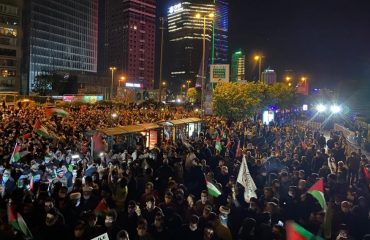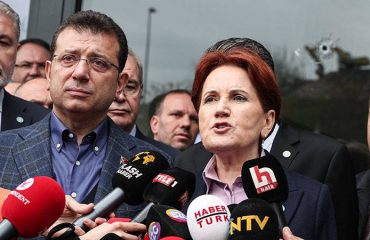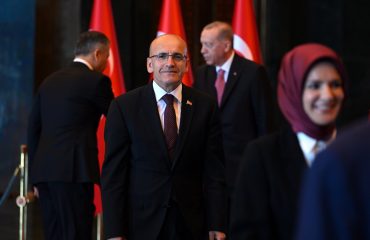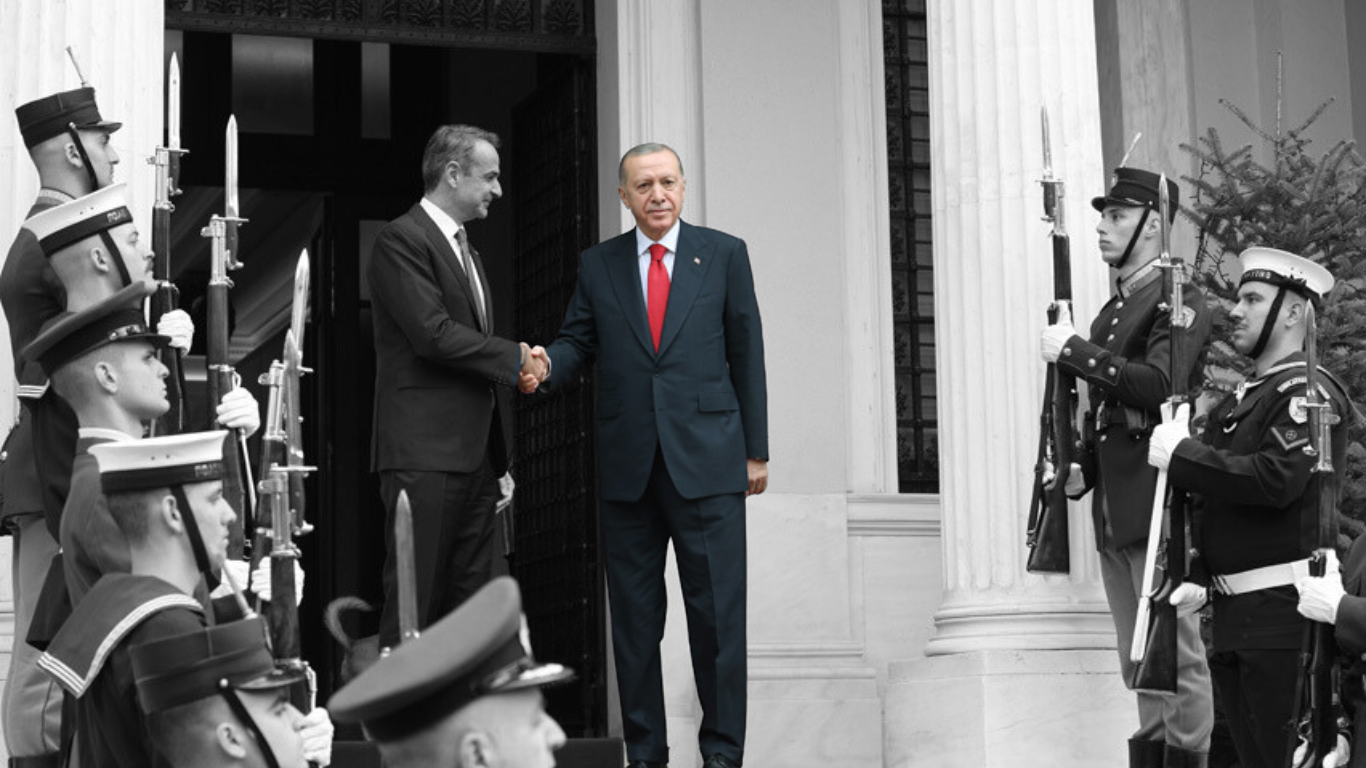
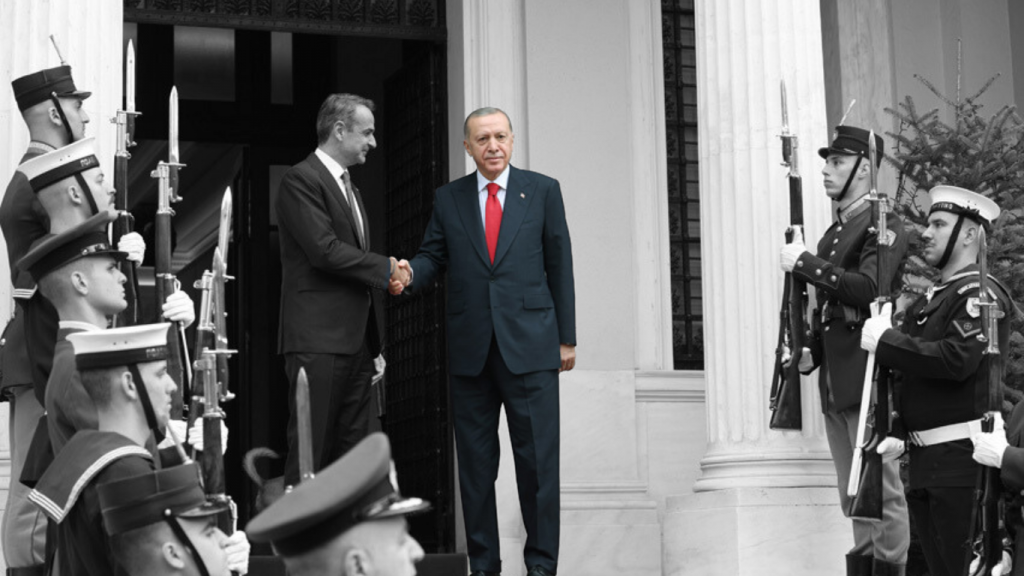
Turkish President Recep Tayyip Erdoğan in Athens visited Greek Prime Minister Kyriakos Mitsotakis whom he said “does not exist for him.” Behind Erdoğan’s sharp turn in foreign policy discourse lies economic and political dimensions of Greece-Türkiye relations. (Photo: Turkish Presidency)
Turkish President Tayyip Erdoğan is in Athens today for talks with Greek Prime Minister Kiryakos Mitsotakis. The High Level Cooperation meeting, which has not been held for seven years, will also take place on this occasion. With steps such as the mutual reduction of military exercises in the Aegean Sea, the world could have a summer and fall at least in the Aegean, and the tourism sector in both countries is pleased.
The Turkish President will tell Greek Prime Minister in Athens that “there are no problem between two countries that cannot be solved through dialogue.” We know that from the interview Erdoğan gave to Greek Kathimerini newspaper before his visit. This is the blandest foreing policy statement Erdoğan has made recently. Especially after the recent escalation of tensions from Israel to Germany, it would undoubtedly benefit both countries and the region if relations between Türkiye and Greece evolve into an atmosphere of cooperation rather than tension.
On his return from the Environment Summit (COP28) in the UAE, Erdoğan told reporters on board his plane that he “hoped that this visit would open a new page” in relations with Greece. He did a good job, but there is one thing that comes to mind.
“I didn’t say it to you, I said it to the PKK”
Kathimerini asked the question that the journalists on the plane did not ask the President.
Two years ago, at Teknofest on September 3, 2022, when the issue of Greece’s arming of the islands was on the agenda, Erdoğan said the following: “Your occupation of the islands does not bind us. We will do what is necessary when the time comes. You know what we say: We can come suddenly one night.” There is also the following sentence: “We have one sentence for Greece: Don’t forget Izmir.”
During the joint press conference with French President Emmanuel Macron during his visit to Paris, Mitsotakis responded to Erdoğan: “We are waiting for you in broad daylight.”
What will Erdoğan say to Mitsotakis in Athens in the light of day? From Kathimerini – and translated by the Directorate of Communications- Erdoğan answered the question stating that “we said ‘we will come unexpectedly one night’ against the terrorist elements threatening the security of our country and we did what was necessary. (…) Greece is not an enemy of Türkiye, but a valuable member of the alliance (NATO).”
“I didn’t say that to Greece, I said it to the PKK,” Erdoğan told Kathimerini.
One thing in Ankara, another in Athens?
The fact that President Erdoğan will meet with Mitsotakis in Athens brings to mind another of his similar outbursts.
Following Mitsotakis’ visit to the US on May 16-17, 2022, during which he was greeted with cheers by US President Joe Biden and the sale of F-16s to Türkiye was also discussed, Erdoğan lashed out. After the Cabinet meeting on May 23 Erdoğan said “there is no more Mitsotakis”; adding that Mitsotakis had made a “third country”, namely the USA, engaged in the bilateral relations, despite Mitsotakis had said “let’s solve our problems between us”. He would not meet him, he would not go where he was, he would not be in the same photo frame. This was the requirement of a principled policy.
Let’s say that it was inevitable for Erdoğan to be in the same frame with him at the NATO Summit, but he also had a bilateral meeting during the NATO Summit on July 12. After all, both of them had won elections; maybe it was the predictions of Beştepe strategies that “Mitsotakis would lose” that misled him and made him say “Never again”.
ANow he is in the same frame with him again in Athens, hosted by Mitsotakis and, as Mitsotakis said, “in broad daylight”.
Al-Sisi was “a dictator”, Bin Salman was “a murderer”
Other examples also come to mind.
For example, on September 25, 2019, during the UN General Assembly, Erdoğan did not sit at the table and protested against the dinner because then US President Donald Trump included Egyptian President Abdel Fattah al-Sisi at the table of honor.
This was about Trump’s letter to Erdoğan three weeks before, calling him “do not be stupid,” a black mark in the history of Turkish diplomacy. This was because Erdoğan had shelved relations with Egypt and declared Sisi a dictator because he had overthrown Egypt’s elected President Mohamed Morsi, a member of the Muslim Brotherhood, in 2013. Then Sheikh Temim, the Emir of Qatar, who is highly esteemed by Erdoğan, stepped in, they reconciled and embraced, and nowadays he seeks more support from Sisi against Israel.
Saudi Crown Prince Mohammed bin Salman,who ordered the murder of Jamal Khashoggi at the Consulate General in Istanbul, was considered “a murderer”. Foreign Minister Hakan Fidan, then head of the National Intelligence Organization (MIT), went and convinced the US administration of this. Today, Erdoğan’s hope for a way out of the economic crisis lies in Saudi Arabia.
Erdoğan in Athens: “Eat a mouthful bite but don’t make big promises”
UAE President Mohammed bin Zaid was declared the financier of the July 15, 2016 coup attempt; today, Vice President Cevdet Yılmaz and Treasury and Finance Minister Mehmet Şimşek are making tour after tour, promising more investment.
Erdoğan’s meetings in Athens on December 7 are yet another example of his harsh rhetoric followed by bland actions. Of course, he is also considering the US and EU aspects of improved relations with Greece, as well as the foreign investment dimension.
“Eat a mouthful bite, but don’t make big promises” is a Turkish proverb. I think it is 7 quite self explanatory.
Erdoğan’s outbursts and u-turns have crossed the threshold that can be explained with decorative words like “successful foreign policy that takes a stance according to changing conditions”. The more frequent the u-turns come, the less effective the harsh outbursts become. Of course, every country should do what is in its own interest at the time. But this does not require you to do and say whatever you think is the harshest thing you can think of at that moment to your interlocutors.
Then what you say in Ankara will be confronted in Athens, as Kathimerini did.
